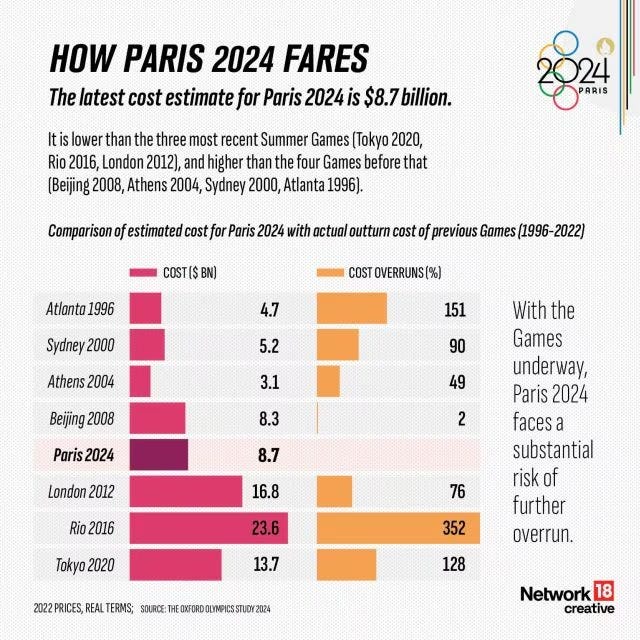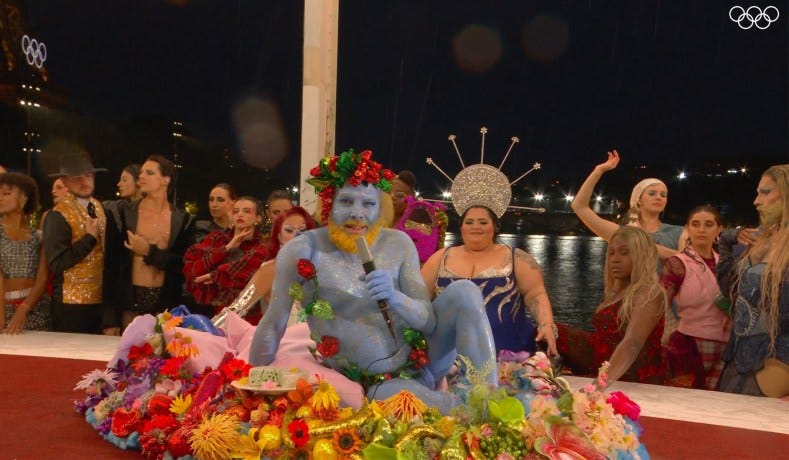The Olympic Games are often seen as the pinnacle of athletic achievement and International Unity, allowing nations of the world to freely celebrate their best sportsmen and women.
Unfortunately, it is also an obvious ripoff and display of vanity.
Every Olympics since 1960 has run over budget, at an average of 172 percent in real terms, the highest overrun on record for any type of megaproject.
The Olympics make engineering mega-projects look prudent in their expenditure.
The Budget
As a recent investigation by the Council on Foreign Relations has shown, The Olympics’ benefits are almost always overstated. Like many other “mega sporting events,” the games often leaves host country financially worse off than if they had not hosted it in the first place.
Although the The Organising Committee for the Olympic Games (Cojo) has argued that “this time will be different” and that “the games will pay for itself”, the signs are that they are repeating the same mistakes of the past. The original budget for the 2024 Olympics (depending on the source) was $8.7 billion, but it seems that, as with other Games, it has exceeded the initial estimates and the number is still climbing.
The total is currently approaching €9.0 billion ($9.66 billion), but is likely to pass 10 billion euros, forcing additional contributions from the government for an Olympics planned under the mantra "the Games finance the Games".
The French Court of Audit found a few financial “issues” with the original numbers and rather unsurprisingly, the Cojo got their initial estimates wrong.
The French Court of Audit said Cojo had committed the traditional Olympic error of underestimating its initial budget. In a sign that times are hard, Cojo recently asked the regional government to contribute to the cost of bus transport for accredited participants, a 10-million-euro expense. The region refused.
It’s a known tactic that when pricing for government contracts (or the military), the strategy to make money is to "low-ball the figures" and then make the profit on the "design modifications”. Cojo is playing the same tried and tested game. S&P ‘s recent analysis found the initial budget is likely to be 25% more than anticipated.
'As S&P Global Ratings report has said that the spending for the Games in Paris is expected to come in at under $10 billion — only about 25 per cent over the initial budget.'
Paris and COJO can obviously get away with claiming that this time it is cheaper, which to their point is true, because compared to the cost of the Rio de Janeiro 2016 and London 2012 games (that had cost overruns in the stratosphere), they are getting a bargain.
But we should ask though, what exactly is all of this $10billion going for?
Clearly the cruise ships on the Seine River and the commercial activity being blocked of for 2 weeks doesn’t cost nothing. The athletes that carried their countries' flags were overjoyed, except for the Algerians, who threw flowers into the Seine to commemorate the 1961 police crackdown. Why are we paying people who are making a scene over an event that took place before any of them were alive?
Drag Queens
Much of the critical media reporting thus far focused on the opening ceremony, which, to be fair, was a spectacle of note. The platform provided an opportunity for performers who did not resonate with everyone, including some controversial choices like drag queens and Lady Gaga.
Why exactly an event that celebrates athletic performance should include a morbidly obese parody on the last supper is beyond me.
The french police state
But as a French Citizen and Parisian, what I find more concerning than the above display of vanity is the amount of money being spent on security! France is employing or the 10 000 soldiers that are taking place in “security operations” around the Paris region and private contractors are milking the situation.
Paris is deploying 35,000 police officers each day for the Olympics, which run Friday to Aug. 11, with a peak of 45,000 for the opening ceremony. In addition, 10,000 soldiers are taking part in security operations in the Paris region.
France also is getting help from more than 40 countries that together have sent at least 1,900 police reinforcements.
Even more disturbing is the QR code system being used to “allow access” to daily life, as well as the use of artificial intelligence and drones that “guarantee security”. Parisians who live close to where the opening ceremonies took place need to "show their papers" to access certain venues, and the French authorities have conducted background checks on over one million applications. Digital Right Campaigners are obviously upset.
Campaigners for digital rights worry that Olympic surveillance cameras and AI systems could erode privacy and other freedoms, and zero in on people without fixed homes who spend a lot of time in public spaces.
Saccage 2024, a group that has campaigned for months against the Paris Games, took aim at the scope of the Olympic security, describing it as a “repressive arsenal” in a statement to The Associated Press.
Naturally France will claim that “terrorism” has been prevented. But it is worth remembering that “terrorism” is a political designation without adequate definition.
The perceived benefits
As the CFR study mentioned above found, the influx of tourists from the Olympic Games often merely replaces the existing tourists that would have come anyways. The overruns is likely to be borne by French taxpayers and once the spectacle is over, once the medals are handed out, and once the cameras turned off, the organizers will move on their their next boondoggle which will be the 2028 Los Angeles Olympics.
The Paris 2024 Olympic Games are not confined to one stadium but spread across the city. This dispersion might make it easier for Parisians to attend some events, but it also adds to the overall disruption of daily life. The tickets are also expensive. Second-hand tickets for the Paralympics and women’s rugby are more affordable than tickets for the center court at Roland Garros or the finals of the swimming event or rugby sevens. Most of the top events will be unaffordable for the average Parisian who is likely to just remain at home.
As is usual with the Olympic Games, the benefits (if any) will quickly be lost.
It’s about Politics
Furthermore there is a political dimension, because the Olympics have always been an opportunity for politicians to display their “country’s values” and the values of “the Olympic games”.
But what exactly did France display with the Opening Ceremony?
Liberty, yet we need a QR code to access certain venues?
Sport above politics? Well Russian Athletes are refused participation.
Was this rule because of an ongoing war of aggression? Clearly not, because Israel and Saudi Arabia were allowed to participate despite the ongoing aggression in Gaza and Yemen.
Solidarity Among Nations? Well sort of, except the Algerians clearly didn’t think much of the event when they decided to use it as an opportunity to settle an old colonial dispute.
Economic Prosperity? Yet we cannot keep the budget under its initial estimates?
Environmental Sustainability? Scientists have already accused it of greenwashing, because flying in passengers and those cruise ships require carbon dioxide!
One of the best insights in trade-off analysis was given by the French economist Frédéric Bastiat when he spoke about "the seen vs the unseen”. The Olympic Games are a good case study of what money could have been spent on if it hadn't been used at all.







The best of what the Olympics bring out inspires me: certain swimming events, gymnastics, track & field. And yet, the issues you raise (which have been a part of decades of fiscal overruns for past host cities) are a sobering reminder that not all is medals and sound bites of the best of what unfolds.
All great points. Maybe the Olympics should just pick a home. Then the site can host World games during the four year gap, and build an economy around sport. I’d hate to see the Olympics disappear. Hugo, reform them the Olympics in a future post, I’d love to see that.